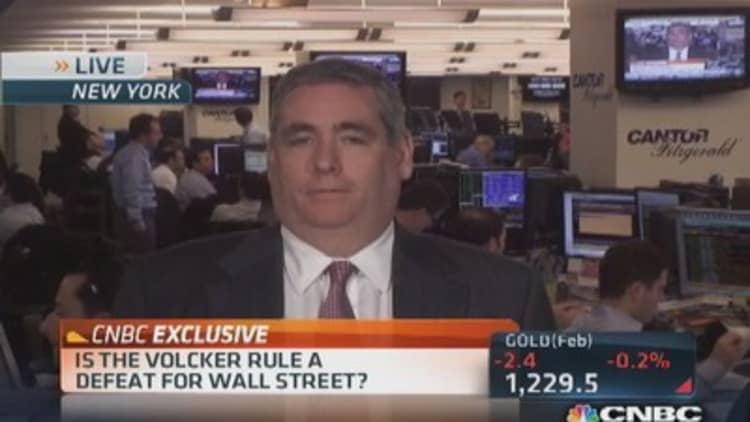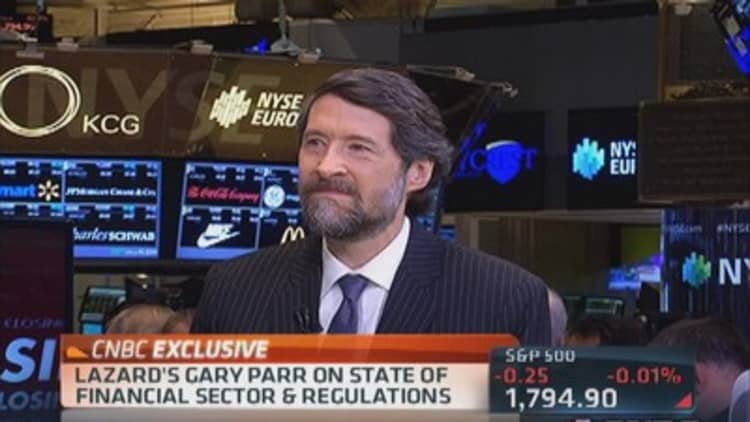
A "tougher" Volcker Rule—which limits how banks can trade their own money—being touted around Washington looks to take aim at executives, should the firms have lapses in oversight, according to people familiar with the matter.
The final draft of the Volcker Rule, which regulators are expected to approve Dec. 10, is said to require CEOs to certify their firms are fully compliant with its 950 pages of regulation. That means senior executives at financial companies are on the hook should there be any missteps.
Previous drafts excluded the CEO certification, but the Federal Deposit Insurance Corp. and the Commodity Futures Trading Commission (two of the agencies tasked with writing the regulation) strongly argued in its favor, according to people familiar with these discussions.
SEC Commissioner Kara Stein, in statements to the American Bar Association, also promised a stronger version of the rule than had previously been drafted. (A public draft has not been seen since November 2011.)
(Read more: Swiss banks prepare to bow to US demands)
"My hope is that when it comes time to vote on it, that the rule will be strong enough and faithful enough to Congress' direction, that I will be able to support it," Stein told the ABA, according to Reuters.
It remains unclear how Washington would require CEOs to sign off on their firms' compliance, though this would not be the first time the top tier of a company was tasked with attesting to its compliance.

In 2003, the Nasdaq and industry regulator FINRA issued rules on internal supervision and controls for member firms like broker-dealers. Those rules—referred to as NASD Rules 3012 and 3013—required a firm's C-suite to sign off on annual reports saying processes for the proper supervision had been in place.
Perhaps more notable is Section 404 of Sarbanes-Oxley, which requires a C-level executive to sign off on an assessment of a company's books at the end of each fiscal year.
While this hasn't seen an upswing in executives jailed for wrongdoing, it has singled out officers by name and prohibited them from working in the industry. Just this week, the Securities and Exchange Commission announced a $6.6 million settlement with Fifth Third that fingered former Chief Financial Officer Daniel Poston for improper accounting of commercial real estate loans.
(Read more: Judge weighs BofA fine alternatives)
While not directly responsible for the loan practices targeted by the SEC, Poston was "familiar" with the them, according to the SEC, and it was his signature on the statements.
Neither Poston nor Fifth Third admitted or denied wrongdoing in agreeing to the settlement.
"We're pleased to bring this matter to a final conclusion and to put it behind us," said Stephanie Honan, a spokesperson at Fifth Third, who declined to comment further.
By singling out management, regulators would have more options to prosecute—or levy multimillion-dollar fines—on the figurehead of a company should it be found to make trades that go against the law.
Much debate has surrounded a giant, complex trade at JPMorgan Chase that ballooned in 2012 and lost the bank $6 billion. The bank, the largest in the country by assets, paid some $1 billion to regulators to settle charges of failed oversight and market manipulation.
(Read more: More measures needed to secure banks: Treasury's Lew)
In 2007, Morgan Stanley trader Howie Hubler wrought a $9 billion loss on the firm, after placing an outsized trade in the mortgage-backed securities market. That stands as the largest-ever single trading loss for a financial firm.
The Volcker Rule, by prohibiting such "proprietary" trades as Hubler's, aims to prevent these losses by placing strict rules on what banks can do with their own money; they can still trade on behalf of clients.
—By CNBC's Kayla Tausche, with additional reporting by Mary Thompson. Follow Tausche on Twitter @KaylaTausche.

